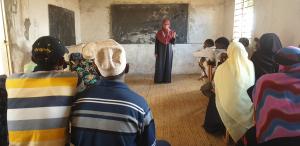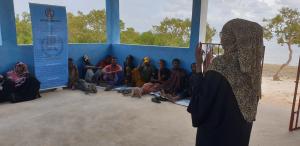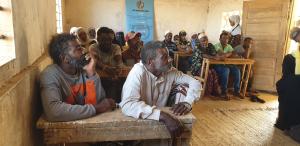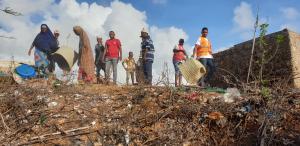Building Capacity of BMUs in Pate – Project Update
In February 2022, Faza Youth Action Group (FYAG) began their 5-month project to engage fishery industry stakeholders including Beach Management Units (BMUs), communities and environmental organisations on Pate Island. One of the key outcomes is to strengthen governance of BMUs, increase the awareness of sustainable fishing practices and facilitate a fishing gear swap in partnership with Northern Rangelands Trust (NRT).
The aim of the project is to empower BMUs to ensure participatory decision-making to achieve the sustainable development of artisanal fishing on Pate while preserving the environmental, social, and cultural integrity of the indigenous community.

Building Capacity of BMUs
Since February, the group have engaged with all BMU chairmen and secretaries from the project area through a wide range of awareness-raising meetings and activities highlighting the importance of protecting the natural environment.
BMUs were introduced in Kenya in 2007 after the national Kenya Fisheries Department failed to promote sustainable fishing throughout Kenya. However, an ongoing challenge is the lack of understanding and awareness of the role of BMUs as co-management institutions. This issue has been highlighted throughout the meetings held. To mitigate this claim, FYAG has been working with the Fisheries Department to explain the regulations and mandates of BMUs.
By providing this kind of awareness, the BMUs are better equipped to put in place desirable solutions to ongoing problems. Some of these solutions were:
- Influencing the county government to prioritise the fishery industry and more emphasis on the conservation of the environment.
- Ongoing BMU training.
- Exposure learning programs to other BMUs to share knowledge and benchmark positive implementation of mandates and byelaws.
- Prioritising the work and mandates as enshrined in the BMUs regulations.

Spotlight on Illegal Fishing Gear
Another key area of this project was to raise more awareness of the harmful use of illegal fishing gear around Pate Island. Some of these gears have been in use for generations while others have been introduced to respond to declining fish stocks.
Many in the community are aware of the destructive nature of these illegal fishing gears, but others believe they have little other option. To mitigate this, FYAG has facilitated workshops to raise awareness of this issue.
Initially, there was opposition to this portion of the project. This was due to fishers feeling their way of life was under threat. However, as the meetings have continued, there has been a greater understanding of the need to curb these practices. There has also been buy-in from the fishers themselves to come up with solutions to reduce their ongoing use. It was also agreed that to fully stop the use of these gears more sensitisation needs to be done so the community has a full understanding of the negative impacts of using these gears. Yet it must go beyond sensitisation as fishers must have the opportunity to receive legal gear.
FYAG is in discussions to make the last point a reality thanks to NRT.

Plastic pollution is adding to issues
A further challenge brought up throughout the meetings is concerns about plastic pollution affecting the ocean. Fishers are becoming more aware of plastic pollution as they increasingly catch more and more waste plastic in their nets and on their lines. The issue is also illustrated by scores of illegal dumpsites lining the seafront in villages across Pate Island.
While BMUs in the area have not historically been part of efforts of on-land environmental conservation, FYAG felt it was essential to engage with them on this issue.
Therefore, as part of other sensitisation activities, FYAG also arranged for a shore cleaning to be undertaken by the community and the BMU members. There was good participation in the clean-up. Community members have also been encouraged to find solutions to illegal dumping by working with other groups in the area that have experience in managing waste.

Read more about the project to build the capacity of BMUs in Pate here.
